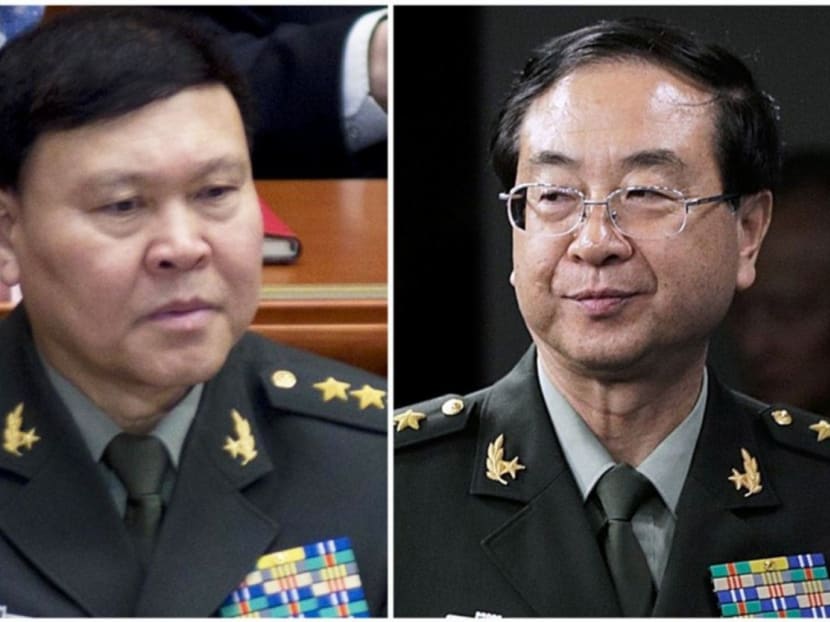Missing Chinese generals give Xi more room to shape military
HONG KONG — Two generals who sit on China’s top military body have been excluded from a twice-a-decade leadership reshuffle next month, setting the stage for President Xi Jinping to carry out a further shake-up of the world’s largest army.

Neither General Zhang Yang (left) nor General Fang Fenghui was among the 303 delegates to the upcoming Communist Party congress. Photo: South China Morning Post
HONG KONG — Two generals who sit on China’s top military body have been excluded from a twice-a-decade leadership reshuffle next month, setting the stage for President Xi Jinping to carry out a further shake-up of the world’s largest army.
Neither General Fang Fenghui nor General Zhang Yang was among the 303 delegates to the upcoming Communist Party congress listed Wednesday by the army’s main newspaper. Their absence, which follows Hong Kong media reports that they are facing disciplinary probes, signals the generals have been taken out of consideration.
That means Mr Xi could fill as many as seven seats on the 11-member Central Military Commission (CMC), the party body that runs the military.
Mr Fang, 66, has been one of China’s most visible officers — accompanying Mr Xi to his first meeting with United States President Donald Trump in Florida, in April — and was positioned by age and rank to rise further.
Last month, he was replaced as chief of the army’s Joint Staff Department by General Li Zuocheng, a move reported by Bloomberg News.
The openings could help Mr Xi cement control over the more than 2 million-member People’s Liberation Army (PLA), as he presses ahead with the most sweeping military overhaul in six decades.
The party congress slated to begin Oct 18 gives the President a chance to replace much of the country’s leadership, including his first reshuffle of the CMC as chairman and commander-in-chief.
As many as five members of the top military body were already expected to step down under an unwritten rule marking senior officials for retirement after 68.
Mr Fang and Mr Zhang — the 66-year-old head of the CMC’s political work department — are among five members below the threshold, which would put them in contention for a powerful vice-chairman post.
Last Friday, Hong Kong’s Sing Tao Daily newspaper reported, citing unnamed people from Beijing, that both men were being investigated for suspected breaches of party discipline.
The Ming Pao newspaper reported that Mr Feng was being investigated, without mentioning Mr Zhang.
China’s Defence Ministry did not respond on Wednesday to a faxed request for comment about the two generals.
Mr Fang, who oversaw security for the 2008 Beijing Olympics, last appeared in public on Aug 21, when he received a visiting senior Thai military officer.
“If a CMC member hasn’t reached the retirement age, but is going to miss the party congress, there must be some special reasons,” said Mr Xu Guangyu, a retired major general and a senior researcher at the Beijing-based China Arms Control and Disarmament Association.
The pair were the only CMC military members not included in the delegation list published Wednesday by the People’s Liberation Army Daily.
No members of the top military body missed the last party congress in 2012.
Since then, there have been prosecutions of two retired CMC vice-chairmen as part of Mr Xi’s sweeping anti-graft campaign. Guo Boxiong — once China’s top uniformed officer — was sentenced to life in prison last year.
Another, Xu Caihou, died of cancer in 2015 while awaiting court martial.
In late 2015, Mr Xi launched a military overhaul to create a US-style joint command structure and establish a force that can “fight and win wars”.
In recent weeks, he has replaced the commanders of China’s army, navy and air force.
This year’s delegation reflects those changes, with members chosen from 31 units, compared with 19 five years ago, including the new PLA Rocket Force. Representatives were required to undergo “political health checks” to make sure they demonstrated ideology, loyalty and respect for Mr Xi and the party’s authority over the military, the PLA Daily reported in May. BLOOMBERG





